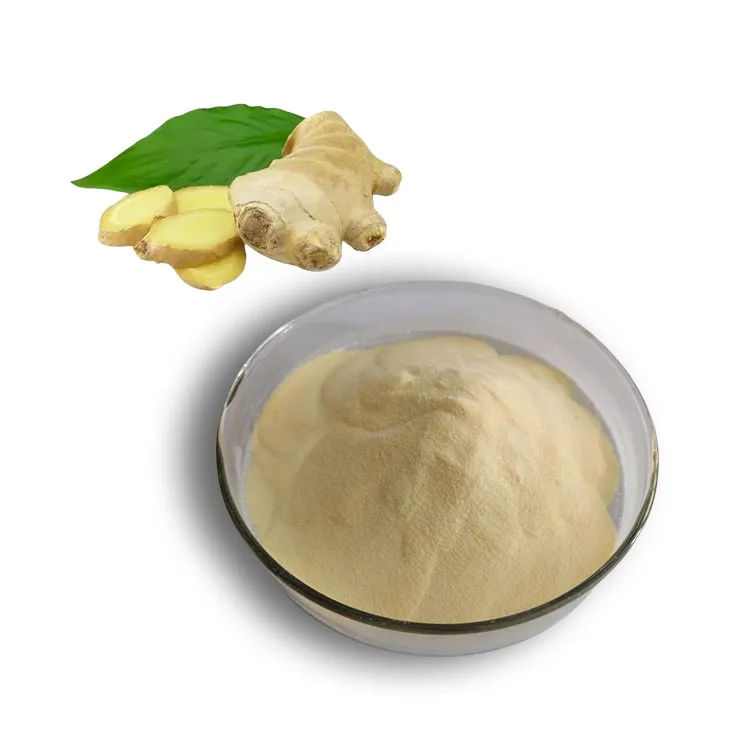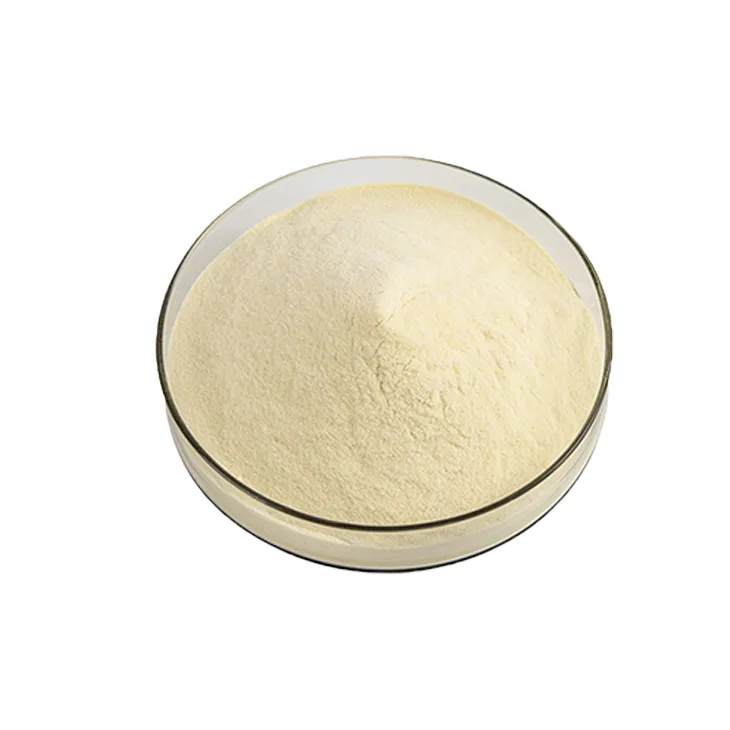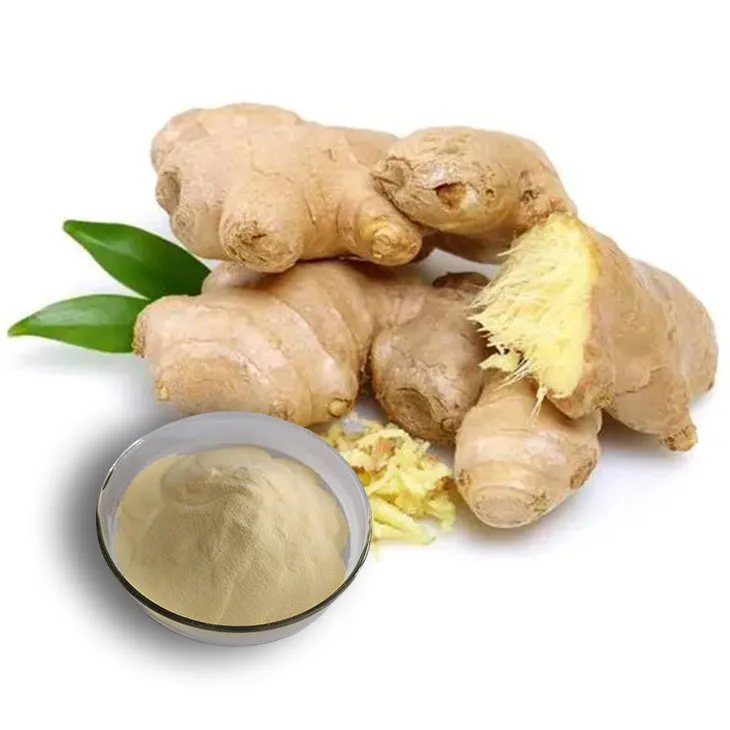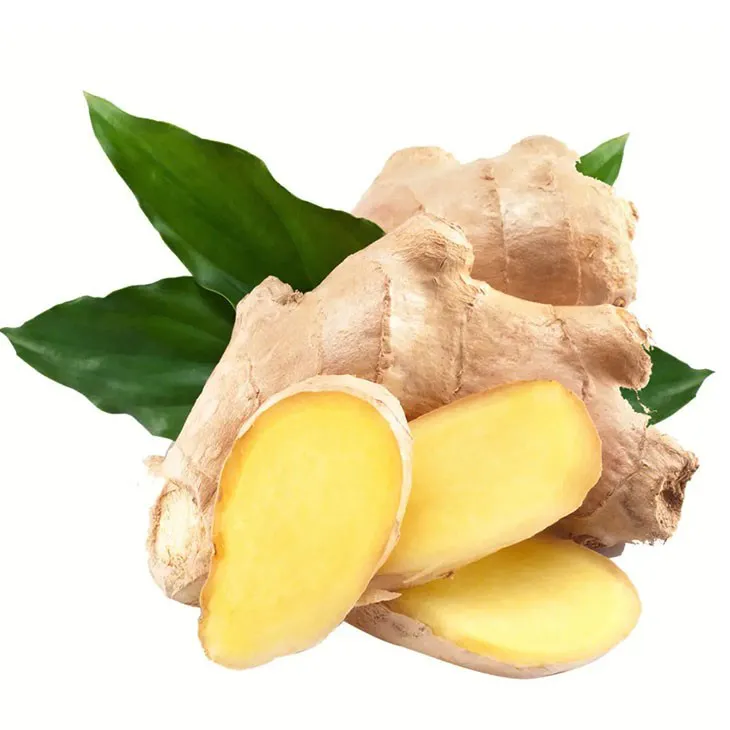- 0086-571-85302990
- sales@greenskybio.com
What are ginger extracts? Definition, types, history and nutritional value.
2024-12-18

1. Definition of Ginger Extract
Ginger Extract is a substance derived from ginger (Zingiber officinale), a well - known plant in the family Zingiberaceae. It is obtained through various extraction methods. These methods are designed to isolate and concentrate the active components present in ginger. The extraction process typically involves using solvents such as ethanol or water to draw out the desired compounds from the ginger root or rhizome.

2. Types of Ginger Extract
2.1 Liquid Extracts
Liquid ginger extracts are common in the market. They are often produced by soaking ginger in a solvent (usually alcohol - based or water - based) for a period of time. This allows the active ingredients in ginger to dissolve into the solvent. The resulting liquid contains a concentrated amount of ginger's bioactive compounds. Liquid extracts are convenient for use in various applications, such as in the production of dietary supplements, herbal remedies, and in the food and beverage industry for flavoring purposes.
2.2 Dried Extracts
Dried ginger extracts are made by removing the solvent from the liquid extract, leaving behind a solid or semi - solid residue. This process concentrates the active components even further. Dried extracts are often in the form of a powder or a paste. They have a longer shelf - life compared to liquid extracts and are easier to store and transport. Dried ginger extracts are widely used in the manufacturing of capsules, tablets, and as an ingredient in cosmetics and topical products due to their concentrated nature and stability.

3. History of Ginger
3.1 Ancient Ayurvedic Medicine
Ginger has a very long and rich history in traditional medicine systems. In ancient Ayurvedic medicine in India, which dates back thousands of years, ginger was highly regarded. It was used for a variety of health conditions. Ayurvedic practitioners believed that ginger had the ability to balance the body's "doshas" (vata, pitta, and kapha), which are the fundamental energies or elements in the body according to Ayurvedic philosophy. Ginger was used to treat digestive disorders, respiratory problems, and as a general tonic to improve overall health and vitality.
3.2 Traditional Chinese Medicine
In Traditional Chinese Medicine (TCM), ginger has also been used for centuries. TCM classifies ginger as a "warming" herb. It is often used in prescriptions to expel "cold" from the body, improve circulation, and relieve pain. Ginger is a common ingredient in herbal decoctions for treating colds, flu, and nausea. In addition, ginger is used in TCM dietary therapy, where it is added to various dishes to enhance the health - promoting properties of the food.
3.3 Global Spread and Use
From its origins in Asia, ginger gradually spread to other parts of the world. Arab traders introduced ginger to the Mediterranean region, and from there it made its way to Europe. In medieval Europe, ginger was a highly prized spice, not only for its flavor but also for its perceived medicinal properties. It was used to treat a range of ailments, including stomach problems and rheumatism. With the Age of Exploration, European colonists brought ginger to the Americas, where it also became popular and was incorporated into the local cuisines and traditional medicine practices.

4. Nutritional Value of Ginger Extract
4.1 Gingerols
Gingerols are the most important bioactive compounds in ginger extract. They are responsible for ginger's characteristic pungent taste and smell. Gingerols have been the subject of numerous scientific studies due to their potential health benefits. They possess antioxidant properties, which means they can help protect the body's cells from damage caused by free radicals. Antioxidants play a crucial role in preventing chronic diseases such as cancer, heart disease, and neurodegenerative disorders. In addition, gingerols have anti - inflammatory effects. Inflammation is a natural response of the body to injury or infection, but chronic inflammation can lead to various health problems. By reducing inflammation, gingerols may help alleviate symptoms of conditions such as arthritis, muscle pain, and inflammatory bowel disease.
4.2 Dietary Fiber
Ginger extract also contains dietary fiber. Although the amount may not be as high as in some other plant - based foods, it still contributes to gut health. Dietary fiber helps to add bulk to the stool, promoting regular bowel movements and preventing constipation. It also acts as a prebiotic, providing nourishment for the beneficial bacteria in the gut. A healthy gut microbiome is associated with better digestion, a stronger immune system, and overall well - being.
4.3 Essential Oils
Small amounts of essential oils are present in ginger extract. These essential oils contribute to the overall efficacy of ginger in promoting well - being. They have antimicrobial properties, which means they can help fight against harmful bacteria, fungi, and viruses. The essential oils in ginger also play a role in its aromatic and flavor - enhancing qualities, making it a popular ingredient in cooking, aromatherapy, and the production of natural perfumes and cosmetics.
4.4 Other Nutrients
In addition to gingerols, dietary fiber, and essential oils, ginger extract contains other nutrients in smaller quantities. These include vitamins such as vitamin C, which is an antioxidant that helps boost the immune system; minerals like potassium, which is important for maintaining proper heart function and fluid balance in the body; and various amino acids, which are the building blocks of proteins. While these nutrients may not be present in large amounts in ginger extract, they still contribute to its overall nutritional profile and potential health benefits.

5. Health Benefits of Ginger Extract
5.1 Digestive Health
Ginger extract has long been known for its beneficial effects on digestion. It can stimulate the production of digestive juices, such as saliva, gastric juices, and bile, which are essential for the breakdown and absorption of food. This can help relieve symptoms of indigestion, including bloating, gas, and nausea. Ginger extract is also effective in treating motion sickness and morning sickness in pregnant women. Studies have shown that ginger can reduce the severity of nausea and vomiting associated with these conditions.
5.2 Muscle Pain and Inflammation
As mentioned earlier, the gingerols in ginger extract have anti - inflammatory properties. This makes it useful for reducing muscle pain and soreness, especially after exercise or physical activity. Ginger extract can also help in the treatment of inflammatory conditions such as rheumatoid arthritis. By reducing inflammation in the joints, it may alleviate pain, stiffness, and improve joint function.
5.3 Antimicrobial Effects
The essential oils in ginger extract give it antimicrobial properties. It can inhibit the growth of certain bacteria, fungi, and viruses. This makes ginger extract potentially useful in the prevention and treatment of infections. For example, it may help in fighting against common cold viruses, oral bacteria that cause bad breath and dental problems, and fungal infections on the skin or in the body.
5.4 Cardiovascular Health
Some research suggests that ginger extract may have a positive impact on cardiovascular health. The antioxidant and anti - inflammatory properties of gingerols may help reduce the risk of heart disease. Ginger may also help lower blood pressure and improve blood lipid profiles by reducing levels of LDL (bad) cholesterol and triglycerides, and increasing levels of HDL (good) cholesterol.
5.5 Anti - Cancer Potential
While more research is needed, there is some evidence to suggest that ginger extract may have anti - cancer properties. The antioxidant and anti - inflammatory effects of gingerols may play a role in preventing the development and progression of cancer. Some studies have shown that ginger extract can inhibit the growth of cancer cells in vitro and in animal models, although human clinical trials are still in progress to confirm its effectiveness in cancer treatment.
6. Applications of Ginger Extract
6.1 Dietary Supplements
Ginger extract is a popular ingredient in dietary supplements. It is often available in the form of capsules, tablets, or liquid drops. These supplements are marketed for various health benefits, such as improving digestion, reducing inflammation, and boosting the immune system. People who may not be able to consume ginger in its natural form, such as those with a sensitive stomach or who dislike the taste, can benefit from ginger extract supplements.
6.2 Food and Beverage Industry
In the food and beverage industry, ginger extract is widely used for its flavor - enhancing properties. It is used in the production of ginger - flavored drinks, such as ginger ale, ginger tea, and energy drinks. Ginger extract is also added to various food products, such as candies, cookies, and savory dishes, to add a spicy and unique flavor. In addition, due to its potential health benefits, some food manufacturers are using ginger extract in functional foods, which are designed to provide additional health benefits beyond basic nutrition.
6.3 Cosmetics and Skincare
Ginger extract is finding increasing use in the cosmetics and skincare industry. The antioxidant and anti - inflammatory properties of gingerols make it suitable for use in anti - aging products. It can help reduce the appearance of wrinkles, improve skin elasticity, and protect the skin from environmental damage. Ginger extract is also used in hair care products, where it may help stimulate hair growth and improve scalp health due to its ability to improve circulation.
6.4 Herbal Remedies
As a traditional herbal remedy, ginger extract continues to be used in natural medicine. It is often used in the form of herbal teas, tinctures, or poultices. Herbalists may recommend ginger extract for treating a variety of ailments, such as colds, flu, digestive problems, and muscle pain, based on its long - standing use in traditional medicine systems and emerging scientific evidence of its health benefits.
7. Precautions and Side Effects
While ginger extract is generally considered safe for most people, there are some precautions to be aware of. In some cases, excessive consumption of ginger extract may cause side effects such as heartburn, stomach upset, and diarrhea. People with bleeding disorders should be cautious when using ginger extract, as it may have blood - thinning properties and increase the risk of bleeding. Pregnant women should also consult their healthcare provider before using ginger extract, especially in high doses, as it may affect pregnancy outcomes.
FAQ:
What are the common extraction methods for ginger extract?
Common extraction methods for ginger extract include solvent extraction, such as using ethanol or water as solvents. Supercritical fluid extraction is also sometimes used. Solvent extraction involves soaking ginger in the solvent to draw out the active compounds. Supercritical fluid extraction uses a substance above its critical temperature and pressure to extract the desired components more efficiently and with better selectivity.
How does ginger extract aid digestion?
The gingerols in ginger extract stimulate the production of saliva and digestive enzymes in the body. These enzymes help break down food more effectively in the digestive tract. Additionally, ginger extract can increase the movement of the gastrointestinal tract, which helps in the proper transit of food through the system, reducing problems like indigestion, bloating, and constipation.
Can ginger extract really reduce muscle pain?
Yes, it can. The anti - inflammatory properties of gingerols in ginger extract play a role in reducing muscle pain. Inflammation is often associated with muscle soreness, and ginger extract helps to counteract this inflammation. It may also work by blocking certain pain - related pathways in the body, providing relief to sore muscles.
What are the antimicrobial effects of ginger extract?
The bioactive compounds in ginger extract, especially gingerols, have antimicrobial properties. They can inhibit the growth of various microorganisms such as bacteria, fungi, and some viruses. This helps in preventing infections and may be useful in the treatment of certain infectious diseases or in maintaining general health by keeping the microbial balance in the body.
How much ginger extract should be consumed for health benefits?
The appropriate amount of ginger extract to consume for health benefits can vary depending on factors such as age, health condition, and individual tolerance. Generally, for adults, consuming 1 - 2 grams of dried ginger extract or 1 - 2 teaspoons of liquid ginger extract per day may be beneficial. However, it is always advisable to consult a healthcare professional before starting any new supplement regimen.
Related literature
- The Nutritional and Medicinal Properties of Ginger: A Review"
- "Ginger Extract: Composition, Bioactivity, and Applications"
- "Ginger (Zingiber officinale Roscoe): A Review of Its Botany, Phytochemistry, and Pharmacology"
- ▶ Hesperidin
- ▶ citrus bioflavonoids
- ▶ plant extract
- ▶ lycopene
- ▶ Diosmin
- ▶ Grape seed extract
- ▶ Sea buckthorn Juice Powder
- ▶ Beetroot powder
- ▶ Hops Extract
- ▶ Artichoke Extract
- ▶ Reishi mushroom extract
- ▶ Astaxanthin
- ▶ Green Tea Extract
- ▶ Curcumin Extract
- ▶ Horse Chestnut Extract
- ▶ Other Problems
- ▶ Boswellia Serrata Extract
- ▶ Resveratrol Extract
- ▶ Marigold Extract
- ▶ Grape Leaf Extract
- ▶ blog3
- ▶ blog4
- ▶ blog5
-
Pure 85% Tomentil Extract.
2024-12-18
-
Garcinia Cambogia Extract
2024-12-18
-
Pine bark Extract Powder
2024-12-18
-
Citrus Aurantii Extract
2024-12-18
-
Withania Somnifera Extract
2024-12-18
-
Aminolevulinic acid
2024-12-18
-
White Peony Extract
2024-12-18
-
Grapefruit Seed Extract Powder
2024-12-18
-
Curcumin Extract
2024-12-18
-
melatonin extract
2024-12-18
-
Chaste Berry Extract
2024-12-18





















